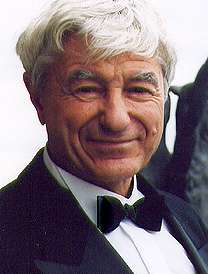Andrey Gagarin
Prince Andrey Petrovich Gagarin (Russian: Андрей Петрович Гагарин; 9 July 1934, in Leningrad, USSR [today St. Petersburg, Russia] – 30 January 2011, in Maryland, USA) was a professor of physics at Saint Petersburg Polytechnical University.
| Andrey Gagarin | |
|---|---|
| Prince Andrey Petrovich Gagarin | |
 Andrey Gagarin in Saint Petersburg in 2002 | |
| Born | 9 July 1934 Leningrad, Russia |
| Died | 30 January 2011 (aged 76) Maryland, USA |
| Burial | Saint Petersburg, Russia |
| Spouse | Tatiana Andreevna Shmit Tatiana Valentinovna Jakovleva Tatiana Ivanovna Nukhina |
| Issue | Princess Maria Andreevna Prince Dmitri Andreevich Princess Julia Andreevna |
| House | House of Gagarin, House of Rurik |
| Father | Prince Peter Andreevich Gagarin |
| Mother | Varvara Vasilievna Sheshina |
Ancestry and background
As the son of Prince Peter Andreevich Gagarin (Russian: Князь Петр Андреевич Гагарин, 1904–1938, victim of Stalin's purges [1]) and grandson of Prince Andrey Grigorievich Gagarin (Russian: Князь Андрей Григорьевич Гагарин, 1855–1920), Andrey Petrovich Gagarin walked in the footsteps of his closest ancestors. His father was a graduate of the same Polytechnical University for which his grandfather was the first rector,[2] and at which Andrey Petrovich Gagarin held a professorship. Great-grandfather was the well known diplomat, artist, officer and the vice-chancellor of the Imperial Academy of Arts Prince Grigory Grigorievich Gagarin (Russian: Князь Григорий Григорьевич Гагарин, 1810–1893), himself a son of Prince Grigory Ivanovich Gagarin (Russian: Князь Григорий Иванович Гагарин, 1782–1837), poet, diplomat and patron of the arts, later ambassador to Rome.[3]
After the Bolshevik seizure of power, most members of Andrey Grigorievich Gagarin's family left the country. Still some decided to stay, a decision that proved dear. In 1938 the last adult Prince Gagarin on Russian soil, Peter Andreevich was executed. His older brother Andrey Andreevich who also stayed in Russia had been executed already in 1937, leaving young Andrey Petrovich Gagarin, at the age of 4, one of the very few surviving Rurikid princes in Russia. He was to be brought up by his mother Princess Varvara Vasilievna Gagarina (née Sheshina, later remarried to Vadim Mikhailovich Burlakov).[4] By using the family name of his stepfather (during 1947-1972),[5] Andrey Petrovich Gagarin was able to obtain higher education that otherwise would not have been accessible for a member of Russia's highest aristocracy.[6]
Prince Andrey P. Gagarin served as the chairman of the Nobility assembly of St. Petersburg[7] and a long-time CILANE delegate.
Marriages and Issue
Andrey Petrovich Gagarin was married three times. Firstly he married Tatiana Andreevna Shmit, no issue. Secondly he married Tatiana Valentinovna Jakovleva and had issue:
- Princess Maria Andreevna Gagarina. Married to Alexander Stanislavovich Korotkov.
Thirdly he married Tatiana Ivanovna Nukhina and had issue:
Title and dynastic branch
The title Knyaz (князь) is a Slavic title found in most Slavic languages, denoting a royal nobility rank. It is usually translated into English as either Prince or less commonly as Duke. In Russia the title was originally a hereditary title for the patrilineal descendants of Rurik.[9][10] The princes Gagarin are a cadet line of the House of Rurik, descending from the Monomakh branch of the Rurikids.[11]
References
- "Список граждан, расстрелянных в Ленинграде, вне Ленинграда и впоследствии реабилитированных (том 8 "ЛМ")". Visz.nlr.ru. Archived from the original on 2011-06-17. Retrieved 2012-01-20.
- "Origins". Spbstu-eng.ru. 1902-10-02. Archived from the original on 2012-09-18. Retrieved 2012-01-20.
- "Лучшая половина жизни". Sta-net.ru. Archived from the original on 2012-03-09. Retrieved 2012-01-20.
- "Санкт-Петербургское губернское Дворянское собрание". Spbgds.ru. Retrieved 2012-01-20.
- "Ахакхнрейю Пеопхмрмшу Хгдюмхи \ Йнмяскэрюмрокчя: Йкюяяхйю Пняяхияйнцн Опюбю". Civil.consultant.ru. Retrieved 2012-01-20.
- "князь". "Vasmer's Etymological Dictionary" online
- "knez". Oxford English Dictionary, 1989, online [1] (subscription required)
- Manaev, G. (2019-07-08). "Who founded Russia and ruled it before the Romanovs?". Russia Beyond the Headlines. Retrieved 2020-01-29.